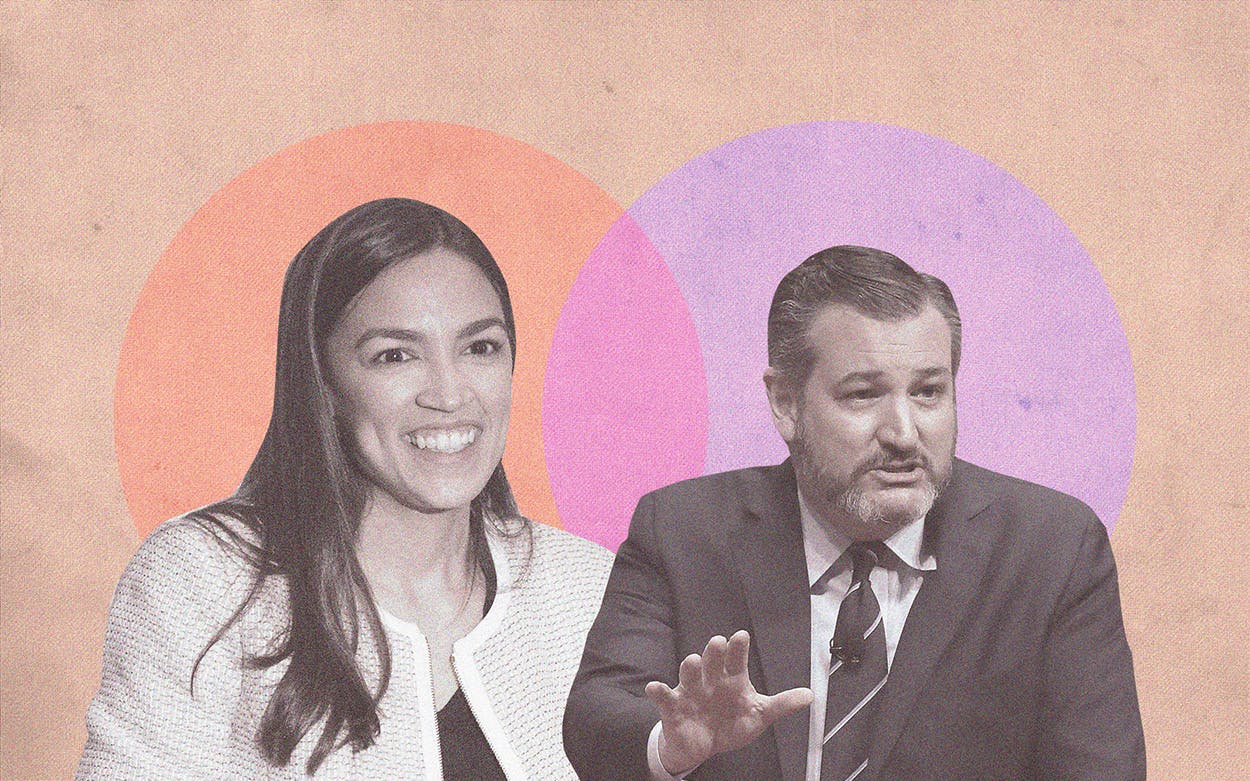Ted Cruz and Alexandria Ocasio-Cortez have very little in common. Cruz serves in the Senate, Ocasio-Cortez in the House. Cruz is a 48-year-old man who grew up in Texas, Ocasio-Cortez is a 29-year-old woman from New York. Cruz worked as a lawyer before entering Congress, Ocasio-Cortez worked as a bartender; Cruz loves Campbell’s Chunky Soup and White Castle hamburgers, AOC prefers Kind bars and chocolate-covered popcorn. Also, when it comes to policy, the two agree on almost nothing, representing what are effectively the two diametrically opposed poles within their respective parties. Ted Cruz may be the hardest-line conservative in the GOP, while Alexandria Ocasio-Cortez is an avowed democratic socialist. Yet Thursday on Twitter, the two began discussing a potential legislative collaboration—and on an issue of real substance, no less.
.@tedcruz if you’re serious about a clean bill, then I’m down.
Let’s make a deal.
If we can agree on a bill with no partisan snuck-in clauses, no poison pills, etc – just a straight, clean ban on members of Congress becoming paid lobbyists – then I’ll co-lead the bill with you. https://t.co/AZTbmdSexv
— Alexandria Ocasio-Cortez (@AOC) May 30, 2019
It began after Ocasio-Cortez retweeted a report from consumer advocacy group Public Citizen about the huge number of former members of Congress taking work as lobbyists after their time in the House. Ocasio-Cortez expressed her disapproval, saying, “I don’t think it should be legal at ALL to become a corporate lobbyist if you’ve served in Congress.”
Cruz responded via his own Twitter account, saying, “I have long called for a LIFETIME BAN on former Members of Congress becoming lobbyists. The Swamp would hate it, but perhaps a chance for some bipartisan cooperation?” Cruz has indeed called for such a ban, including in a 2015 op-ed for USA Today, where he wrote, “We can stop the Washington corruption, in part, by […] imposing a lifetime ban on members of Congress becoming lobbyists.”
Bills along these lines have been introduced before, of course. The catchily named “No Golden Parachutes for Public Service Act” (or the positively zippy acronym, NGPFPSA) has been introduced, in various forms, since 2010—sometimes by Democrats like AOC and presidential aspirant Senator Michael Bennet, D-Colorado, sometimes by Republicans like Cruz and Representative Rod Blum, R-Iowa, but all attempts have been doomed to failure no matter how bipartisan they may be.
Passing a law that forbids lawmakers from pursuing a lucrative—and incredibly common—post-politics career path is difficult for obvious reasons. Even if there are politicians willing to cut off an opportunity for themselves, persuading several hundred of their colleagues to do the same is a tall order—and while voters generally dislike corruption, there’s not exactly a big grassroots movement to overcome the institutional obstacles.
In that way, a titanic team-up of two of the highest profile, most polarizing, and ostensibly opposed politicians in each party carries some interesting weight. “Ban lawmakers from becoming lobbyists” might not be at the top of any voter’s list of top priorities, but when you hear that there’s an issue that Ted Cruz and Alexandria Ocasio-Cortez agree on so much that they are cosponsoring legislation to address it … well, it’s probably something pretty important. (Or it’s, you know, a resolution to honor National Puppies Are Cute Day.)
And the issue certainly does matter. Washington, D.C., is a town full of absurdly wealthy people, which means that a member of Congress can often feel like a have-not—in 2008, for example, former North Dakota senator Kent Conrad lamented his “senator’s salary” when talking about how his family was able to afford their million-dollar Maryland beach house only because his lobbyist wife paid for it. Perhaps it’s no surprise that nearly 60 percent of those who served in Congress from 2017 to 2019 now work as lobbyists. If there were a university that could guarantee a 60 percent job placement rate in a lucrative field that didn’t require a ton of actual work, applications would be through the roof—what Cruz and AOC are concerned about is the idea that perhaps some of their colleagues see their time in Congress as the next best thing.
We’ll see if anything actually comes of this Twitter exchange, or if it was just the briefest hint of a crossover that’ll never actually happen, like the G.I. Joe vs. Transformers movie. It is, ultimately, the sort of legislation that would be broadly popular with almost everyone. It’s good for Democratic voters, Republican voters, people who don’t vote because they feel like politics are too corrupt to make it worth the effort, a president who likes doing things that are popular, a handful of politicians who can’t imagine a future for themselves lobbying their former colleagues on behalf of pork rinds or whatever—basically everybody except the majority of lawmakers themselves.
- More About:
- Politics & Policy
- Ted Cruz








